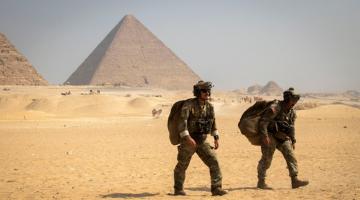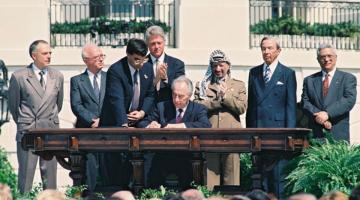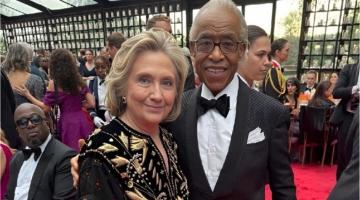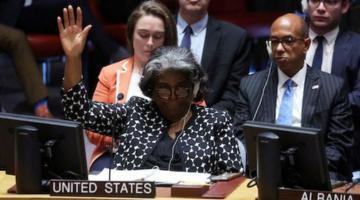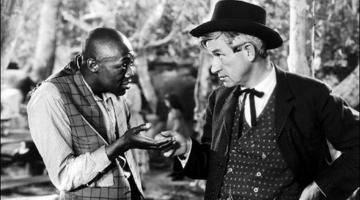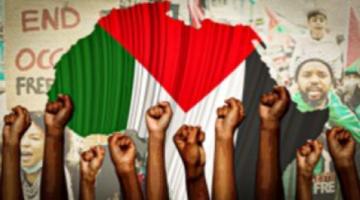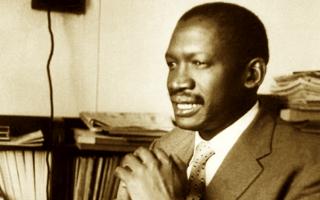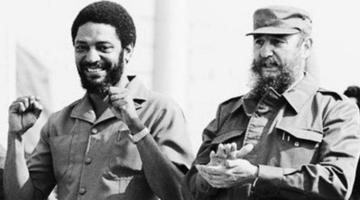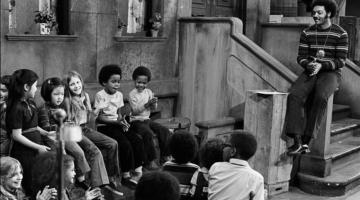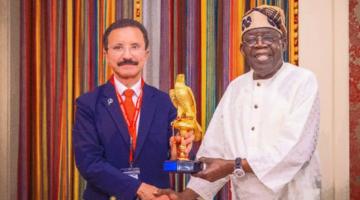US Secretary of State Antony Blinken meets with Palestinian President Mahmoud Abbas in West Bank on January 10, 2024 [Reuters/Evelyn Hockstein]
One of the many unfortunate common threads between Palestinians, South Africans, and African Americans is the betrayal of the people by their political leadership who were meant to lead them into a better future. Instead, they were abandoned while those leaders became puppets of imperialist powers.
The assault on the Palestinian Authority’s headquarters in the West Bank occurred only days after Israel began its siege of Gaza in October of 2023, leaving the building pockmarked with bullet holes.
It might be surprising to know, however, that the assailants were not the Israeli Defense Forces, nor any settler mobs but the throngs of Palestinians who live under occupation and assembled outside the government building in Jenin to protest Israel’s control of the quisling Palestinian Authority, known as the Sultah.
The Los Angeles Times wrote of the dispute:
Disgusted with the authority’s inability to protect its own people or stand up to Israel, militants in the crowd aimed their bullets at the government compound after its security forces tried to break up the demonstration.
‘The Sultah started firing live rounds at us to stop it, so the guys fired back,’ said Abu Hamzeh, a bulky 37-year-old fighter with the Jenin Brigade, a cross-factional Palestinian resistance group that includes members of Hamas, Islamic Jihad and Fatah.
His comrade in arms beside him, hand on the butt of a weathered-looking M4 rifle, warned of Palestinians’ growing anger with their nominal rulers alongside their antipathy toward Israel.
‘When things get beyond the limit, it’s a problem,’ said Abu Mohammad, 33. “When you pressure us, there will be an explosion. We’re facing both Israel and the Sultah.’
A similar sense of betrayal characterizes the relationship between South Africa’s teeming Black majority and the country’s ruling party, the African National Congress, or ANC. Thirty years after voters of all races went to the polls for the first time to elect Nelson Mandela president, his party, the ANC, has failed to substantively improve the standard of living for Africans who were violently dispossessed by 48 years of white-minority rule, known as apartheid.
Equally troubling is that the Black South Africans who have benefited most from apartheid’s repeal are typically ANC stalwarts such as the country’s current president, Cyril Ramaphosa, a former labor leader and top Mandela lieutenant who raked in hundreds of millions of dollars as the face of the nation’s affirmative action policies that followed white-minority rule.
In 2012, police opened fire on hundreds of striking mine workers who were demanding a basic monthly wage of $800, resulting in 44 deaths, more than 70 injuries and 250 arrests. Ramaphosa was a shareholder in the British-owned mining company at the time of the massacre and sent emails to company executives cryptically encouraging the brutal crackdown.
More recently, the ANC in June formed a coalition government with the mostly white Democratic Alliance, or DA, a party that is widely associated with the National Party that was responsible for apartheid. The move–which was intended to avoid forming coalitions with two left-leaning Black political parties, has drawn fire from a wide swatch of the country.
One union spokesperson, Phakamile Hlubi-Majola, described the DA as the “party of the oppressors” and complained that the appointment of a white education minister would give the DA “the keys to the minds of our children”.
Writing in a local online newspaper, Mphumzi Mdekazi, a doctoral student at Cape Town’s Stellenbosch University, opined that “the DA is driven solely by the group interest of white people, its interest is diametrically opposed to the historical mission of the ANC and of African people.” In summation he denounced as “native traitors” anyone who accommodated the DA’s inclusion in executive government.
Mdekazi’s stern rebuke of South Africa’s Black political class echoes the language and tone deployed last month by African American protesters who heckled New York City’s Black Mayor Eric Adams during a press conference to refute corruption charges handed up by a federal grand jury.
Calling Adams a “disgrace” and a “sellout,” the hecklers referred to the police department’s brutal occupation of Black and Latino neighborhoods in the city, and fiscal policies that deepened New York City’s affordable housing crisis, accelerating gentrification. Adding fuel to the fire was Adams surrounding himself with a coterie of African American clergy and civic leaders at the press conference outside Gracie Mansion.
“This is a you thing, Eric Adams,” one man can be heard saying off-camera. “This is not a Black thing. Your policies are anti-Black, you’re a disgrace for all Black people in this city. The things that you have done are unconscionable. Our children are harassed by police. This is ridiculous, this is ridiculous. You can shush me all you want, but the people are with us. This is not a Black thing, this is a justice thing.”
It should be noted that Adams is no outlier. Over the last 30 years, the distance between the African American working class and their elected representatives has widened dramatically and Black people’s disillusionment with Vice-President Kamala Harris jeopardizes her chances of winning the White House next month.
When Mandela was freed from prison in 1990 after 27 years as a political prisoner, Black South Africans, Palestinians and African Americans were known as a transnational axis of resistance against European settler colonialism. Malcolm X, the Black Panthers and activists with the Student Nonviolent Coordinating Committee took up the cause of Israel’s occupation following the 1967 war; an African American couple working at Polaroid jump started the international boycott of apartheid South Africa in the early 1970s and barely two weeks after Mandela’s release from prison, the Palestinian Liberation Organization’s leader, Yasser Arafat flew to Zambia to meet with him. The two embraced and Mandela was fond of saying that Black South Africans could never be truly freed from apartheid as long as Palestinians lived under Israeli occupation.
More recently, Palestinian resistance fighters counseled Black Lives Matter activists protesting the fatal police shooting of Michael Brown in suburban St. Louis in 2014; in January, South Africa charged Israel with genocide at the International Court of Justice, and among the poems written by Marcellus “Khaliffah” Williams as he awaited execution by the state of Missouri was one entitled “The Perplexing Smiles of the Children of Palestine.” Williams, a 46-year-old African American, was executed on September 24, despite a lack of physical evidence linking him to the 1998 murder of a white, St. Louis woman.
But as the struggle against settler colonialism enters its final stages, African Americans, Palestinians and Black South Africans are increasingly united by their aggrievement with the political class that once led them into battle.
A political economist and deputy chairman of the South African Institute for International Relations, Moeletsi Mbeki told Black Agenda Report that it is not a coincidence that the ANC was founded in 1912, three years after the NAACP, which was founded by white liberals and the Black bourgeoisie.
Similarly, the ANC has traditionally been dominated by an African middle class; Mandela, for instance, was a lawyer and the scion of a royal family from the country’s Eastern cape region.
“The ANC set out to liberate the African middle class,” said Mbeki, the brother of South Africa’s former President Thabo and the son of Govan Mbeki, a dissident who was imprisoned with Mandela at Robben Island, the infamous apartheid-era prison. “Like the NAACP, the ANC set out to advance the interests of the African middle class. The movement internationalized (in the 1950s following the birth of apartheid) but it never stopped being an instrument of the Black middle class.”
Continuing he said.
As a result, the African middle class is doing very well but the building up of the Black middle class since apartheid ended has been at the expense of the working poor. The ANC taxes all of the social groups and then it takes that money to pay huge salaries to the Africans who work for the state.
Noting that the ANC did not nationalize any industries after it came to power in 1994, Mbeki said:
The ANC does not oppose the capitalist system and has in fact always admired the capitalist system in the UK and America. . .That is the thrust of our problem in South Africa: consumerism by the Black middle class.
Certainly, the same trinkets, baubles and creature comforts that seduced the ANC persuaded a generation of African American politicians to betray their constituents. Since leaving the White House eight years ago, Barack Obama has accumulated a fortune of an estimated $70 million, much of it from the Wall Street investors who he coddled following the 2008 collapse of the real estate market.
Michael R. Fischbach, a history professor at Randolph-Macon College and the author of Black Power and Palestine: Transnational Countries of Color, told Black Agenda Report that settler colonialism, by design, frustrates economic development and leaves subjugated populations with few opportunities to make a decent living. South Africa’s whites, as one example, account for six percent of the population but continue to own more than three-quarters of all arable land in the county.
It is not inevitable but this idea of using power to bolster one’s own fortunes is tempting; there are some deep structural issues at play. There is this immense system that we have to contend with: how do we now feed our children yet unlock a system that is so entrenched. . . and structured to keep you out. Like Mandela, Arafat personally lived a pretty humble life but he completely tolerated corruption and . . .was under immense pressure from the Americans and the Israelis to crack down on the Palestinian resistance to keep them from attacking the Israelis. . .The PA has become a security subcontractor for the IDF.
Much like the ANC’s failures have led to the rise of the Marxist political party, the Economic Freedom Fighters in South Africa, the Palestinian Authority’s Vichy government paved the way for Hamas’ 2006 election in Gaza. Fischbach said:
The PA was very tarnished for having made all of these compromises and gotten absolutely nothing in return. . The people who support Hamas say that the PA got us nothing. We’re beaten up by our own countrymen. A lot of Hamas’ success was not so much that they believed in an Islamic state but that they were the new iteration of the angry young men who captured the Palestinian imagination in the 1960s. They’re saying: we are not corrupt, we are living among the people, we’re not compromising, we are doing what the PA did in the 1960s. It was their commitment to total liberation that won the day.
So powerful is settler colonialism, say many scholars in the U.S. and across the global South, that it simply exhausts generations of liberation movements and its leaders. Only the most indefatigable and selfless movements can maintain revolutionary discipline in the face of constant scrutiny, harassment, and setbacks and the daunting challenge of rebuilding an underdeveloped economy. Crises of faith are virtually a stage of the revolutionary process. As proof, academics often point to independence heroes such as Arafat, Zimbabwe’s late President Robert Mugabe, and Washington D.C. Mayor Marion Barry as examples of leaders of political or resistance movements who at some point late in their careers seemed to give up on transformative policies and eventually settle for maintaining their own comfortable positions or spend their final years cutting deals that benefited their own bottom line. Said Fischbach:
I think any liberation movement has to deal with this reality that the odds are hopelessly stacked against us. You have to account for the fact that you’re likely to lose some people along the way.
Jon Jeter is a former foreign correspondent for the Washington Post, Jon Jeter is the author of Flat Broke in the Free Market: How Globalization Fleeced Working People and the co-author of A Day Late and a Dollar Short: Dark Days and Bright Nights in Obama's Postracial America. His work can be found on Patreon as well as Black Republic Media.

